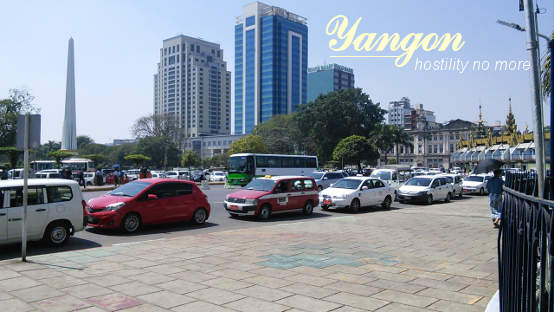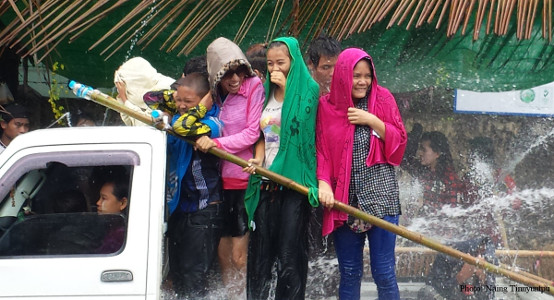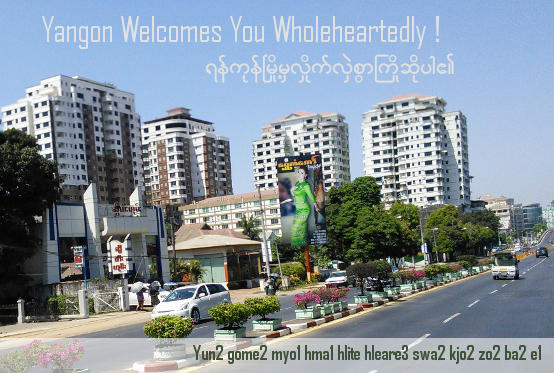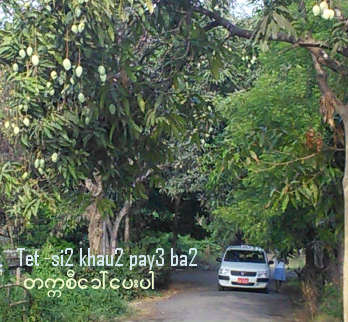Burmese Phrasebook for the Tourists 📖
So far, we have covered a lot of grounds on useful basic Burmese vocabularies, words, and phrases. Although new lessons are added as time goes by, I will keep the Myanmar conversational phrases as simple as possible, so that you can jump in at any lesson without difficulties.
In this lesson, I am going to focus on essential travel phrases for the tourists. Some of the words and phrases are already covered in the previous lessons, so if you have been following me, this will be like a review. For the tourists who discover this page through the Internet search, this lesson will be a useful information put together in one page.
Calling a taxi or a doctor 📞
As a traveler, you definitely need a transport. Although some travel agencies provide guided tours inclusive of transport, some tourists prefer to make adventures on their own. If you are one of such individuals, you can go to the front desk in your hotel and ask:
tet-si2 — taxi
khau2 — call
pay3 — give
ba2 — soft polite tone
tet-si2 khau2 pay3 ba2 — Can you call a taxi for me, please?
hsa1-ya2-woon2 — doctor
khau2 — call
pay3 — give
ba2 — soft polite tone
You can use the same sentence construction with "doctor" in place of "taxi".
hsa1-ya2-woon2 khau2 pay3 ba2 — Can you call a doctor for me, please?
Can you do this for me, please? 🚕
So, the general pattern of making such requests is:
xxxx pay3 ba2 where,
xxxx is the action word (verb).
pay3 means to give. In Myanmar grammar, when this word is used as a suffix word after an another verb, it becomes a particle meaning to do something for someone, or on the behalf of someone.
ba2 is a polite ending word which softens the tone, as opposed to a command.
If the request is the first phrase as you approach someone for help, and not in the middle of the conversation, include "for me", or "to me" in the beginning of the phrase.
kja1-nau1 — me (male term)
go2 — roughly means "to" or "for"
xxxx — do something
pay3 ba2 — polite ending word.
kja1-nau1 go2 xxxx pay3 ba2 - Please do xxxx for me (male).
kja1-ma1 go2 xxxx pay3 ba2 - Please do xxxx for me (female).
I have covered a list of verbs that you can use in lesson7. For example, you can say,
a-woot shau2 pay3 ba2 — Can you wash clothes for me, please?
dau2-la2 leare3 pay3 ba2 — Can you exchange dollar (into kyat) for me, please?
Can you take me to xxxx ? ⛵
The general pattern of making this type of request is:
xxxx po1 pay3 ba2
lay2-yin2-byan2 gwin3 — airport (airplane + field) [noun]
po1 — send [verb]
pay3 — give [verb]
ba2 — soft polite tone [particle]
lay2-yin2-byan2 gwin3 po1 pay3 ba2 — Can you take me to the airport, please?
A shorter word for airport is lay2 zate. You will find this word on maps and road signs. The table below is a list of some useful vocabularies that you can substitute in place of the airport.

| AUDIO ↑↓ | ENGLISH ↑↓ |
|---|---|
| bu2-da2 yone2 | train station |
| thin3-bau3 zate | river jetty; harbor; quay |
| hlay2 zate | jetty for motorized boats |
| hsay3 gun3 | clinic |
| hsay3 yone2 | hospital |
| bun2 | bank |
| yeare3 sa1-khan3 | police station |
| xxxx yone3 | xxxx office |
| thun2 yone3 | embassy |
| xxxx hsine2 | xxxx shop |
| sa3-thout hsine2 | restaurant |
| in2-ta2-net hsine2 | Internet Cafe |
| sa2-oat hsine2 | bookshop |
| a-hmut-ta1-ya1 pyit-si3 youn3 zine2 | souvenir shop |
| za1-bin2 hnyut hsine2 | hair dresser |
| xxxx ho2-teare2 | xxxx Hotel |
| teare3-kho2 gun3 | Guest House |
| yay2-ku3 gun2 | swimming pool |
| gout kwin3 | Golf Course |
| kun3 jay2 | beach |
| kun3 na3 | waterfront |
| xxxx pan3-jan2 | xxxx Garden/Park |
| xxxx lun3 | xxxx Road |
| xxxx pfa1-ya3 | xxxx Pagoda |
| xxxx zay3 | xxxx Market |
| a-youn3 pya1 gun3 | showroom |
Shopping and eating out 🍻
beare2 lout leare3 — How much? (how much + ending question word)
da2 beare2 lout leare3 — How much is this? (this + how much + ending question word)
beare2 lout kja1 ma1-leare3 — How much will it cost? (how much + cost + will + ending question word)
Please refer to lesson 12 for numbers.
Use the phrase "xxxx ya1 ma1-la3 to ask if something is available or if it is OK to get something done. (Please see lesson 15 for more on ordering food and drinks including restaurant menus.)
ya1 - is the verb "to get" or "to obtain" in Burmese grammar, but it can also be roughly translated as an adjective "available". For example
be2-ya2 ya1 ma1-la3 - Can I get beer? roughly means: "Is beer available here?"
If someone tries to sell you something that you don't want, say:
ma1-weare2 thay3 bu3 — Not buying this time. (negative + buy + still not + negative ending)
How to make a bargain in Burmese? 🉐
There are still many places in Myanmar where you can make a bargain, like souvenir sellers and roadside used books vendors. While there are a good many honest merchants making their decent living, some cannot resist the temptation to hike up the price a little when they see foreigners with lots of cash. What can you do? The small amount of extra money that they ask may mean nothing to you, but it can feed a poor family for a day in this country — just a small input for your consideration. However, if you're certain that the greed is ridiculously high, you can then use the phrase:
shau1 ba2 ome3 — Please decrease or reduce a little.
Can I take photo? 📷

dut-pone2 — photo
yite — strike (take photo)
lo1 — take the course of action
ya1 — get it done
ma1 — will be
la3 — ending question word
dut-pone2 yite lo1 ya1 ma1-la3 — Can I take photo?
Looking for a washroom or a toilet 🚹 🚺
de2 hma2 — here (this place + at)
ain2-dtha2 — toilet
shi1 — exist
la3 — ending question word
de2 hma2 ain2-dtha2 shi1 la3 — Is there a toilet here?
ain2-dtha2 — toilet
beare2 hma2 — where (where + at)
shi1 — exist
leare3 — ending question word for "what", "why", "which", "where", "when", "how", "how many", "how much".
ain2-dtha2 beare2-hma2 shi1 leare3 — Where is the toilet (or) where can I find the toilet?
( Refer to lesson 5 for location and direction words.)
When will it be? ⌚
beare2-dau1 yout ma1-leare3 — When will it or he or she arrive? (when + arrive + will + ?)
beare2-dau1 la2 ma1-leare3 — When will you come? (when + come + will + ?)
beare2-dau1 thwa3 ma1-leare3 — When will you go? (when + go + will + ?)
beare2-dau1 thwa3 ja1 ma1-leare3 — When will we go? (when + go + plural + will + ?)
Take note that there is no "you" "we" or "it" stated explicitly in the phrases. For the answers to such questions regarding time, please refer to time expressions in lesson 13.
Simple questions using "what", "which", "where", "who", "why", "how", and "how many" ❔ ❔ ❔
da2 ba2 leare3 — What is this? (this + what)
beare2 ha2 leare3 — Which one? (which + object + ?)
beare2 hma2 leare3 — Where is it? (where + at + ?)
beare2 dthu2 leare3 — Who? (which + person + ?)
thu2 beare3 — That's him! (he + exactly!)
ba2 pfyit lo1 leare3 — Why?, Why didn't you?, etc.. (what + happen + because + ?)
beare2-lo2 leare3 — How did it go? How is it going? (how + ?)
da2 beare2-lo2 khau2 leare3 — What do you call this in Burmese? (this + how + call + ?)
beare2 hna1-yout leare3 — how many persons?
How to say "sorry" in Burmese
Some Burmese authors attempt to translate "sorry" word from English novels as
wun3-neare3 ba2 deare2 - (be sorry + polite + ending word)
When Burmese people hear this phrase, it gets the impression that the speaker is a Westerner. The phrase does not catch on to become a common usage.
The more colloquial phrase for "sorry" as in "I'm sorry to hear that" is
sate ma1-koun3 ba2 bu3 - (mind or spirit + not + good + polite + negative ending word)
When someone accidentally touches an another person, especially to an elder person, Burmese people will say,
ga1-dau1 ... ga1-dau1 - (show of respect and/or gratitude). This word is equivalent to "sorry".
Another usage of "sorry" in English is when you did not hear or understand what the other person said, which is like saying "excuse me, can you say that again?"
beare2-lo2 leare3 — how? - (how + ?)
pyan2 pyau3 ba2 ome3 — Can you say that again? - (prefix: "repeat" + speak + polite + ending word)
Excuse me!
If someone is in the way in the crowded place and you don't want to be rude by pushing your way through or wait for the person to get out of the way, you can say this:
neare3-neare3 — a little
lout — just about; not exact
neare3-neare3 lout — Excuse me! Excuse me, please!
This phrase requesting to move a little is often heard on the crowded public buses during the rush hours as people try to shove their way to the exit door.
Meeting, greetings, saying thank you and good-bye
I have already covered basic greetings, meeting, questions and answers in previous lessons, so I will just summarize them here without giving detailed explanations. For details on basic questions and answers, please refer to lesson 2.
nay2-koun3 la3 — How are you?
tway1 — meet (verb)
ya1 da2 — as for being able to (particle)
wun3-tha2 — be glad(verb) equivalent to happy (adjective in English)
ba2 deare2 — polite affirmative ending words. (particle + postpositional marker)
tway1 ya1 da2 wun3-tha2 ba2 deare2 — Nice to meet you!
nun2-meare2 beare2-lo2 khau2 leare3 — What's your name? - (name + how + call + ?)
in3-ga1-late — English
za1-ga3 — spoken language
pyau3 — speak, tell, say
tut — suffix particle: know how to
dtha1-la3 — ?
in3-ga1-late za1-ga3 pyau3 tut dtha1-la3 — Can you speak English?
neare3 neare3 — a little
pyau3 — speak, tell, say
tut — suffix particle: know how to
deare2 — affirmation.
neare3 neare3 pyau3 tut deare2 — Yes, I can speak a little.
kjay3-zu3 — a good deed done on an another person.
tin2 — to explain the fact as in tin2 pya1
ba2 deare2 — polite ending word with emphasis on tin2.
kjay3-zu3 tin2 ba2 deare2 — Thank you!
ah3-na2 za1-ya2 ji3 — You are so kind and hospitable!
What does ah3-na2 mean? See lesson 20 for explanation.
ya1 ba2 deare2 — No problem! (can be done + polite + ending word) equivalent to "You're welcome!"
thwa3 ba2 ome3-meare2 — Good-bye! (go + polite + action to be taken first + ending word indicating future: "will")
nout pyan2 tway1 ja1 meare2 — See you again! (next time + repeat + see + plural + ending word indicating future: "will")




